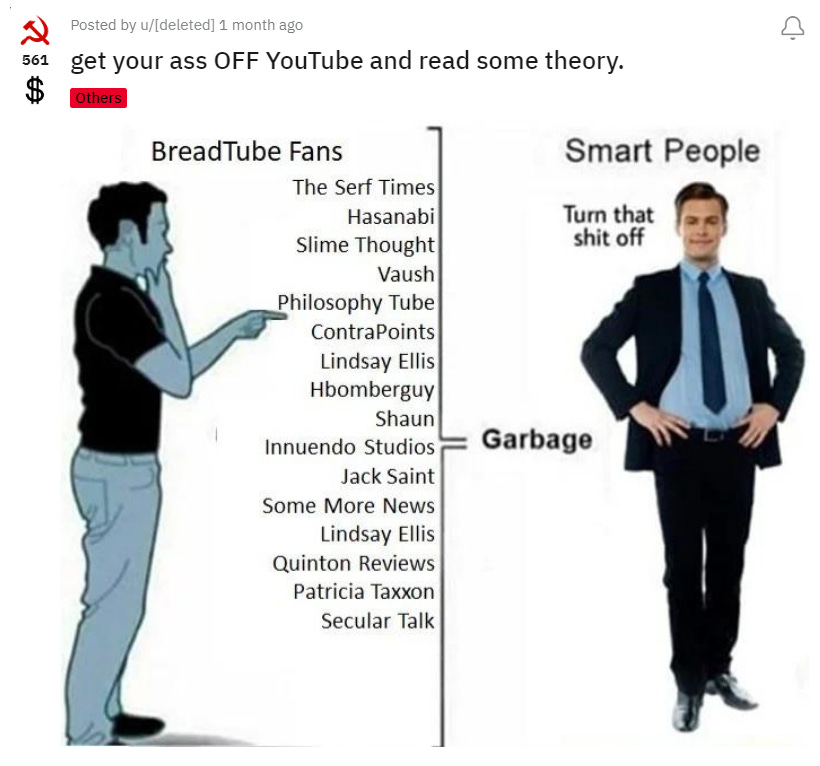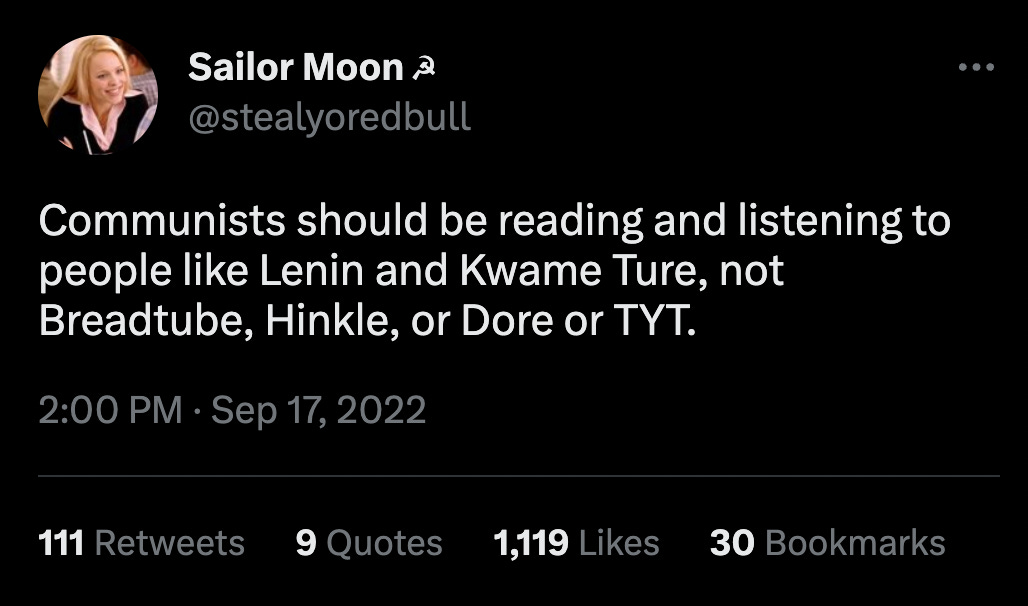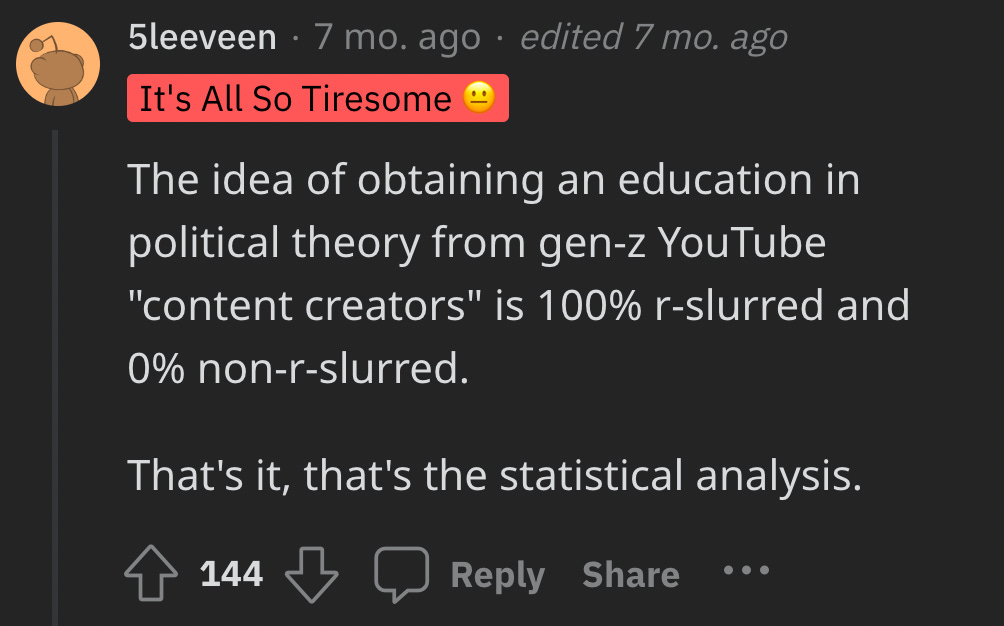Nobody Wants To Read Theory: Why Socialism Must Be Fun
"Who’s gonna join your book club if it sucks?"
"Infotainment" or "edutainment" is any kind of media that aims to both inform/educate and entertain its audience.
Many lefties criticize leftist infotainment as shallow, inferior content that teaches viewers little. In contrast, they argue, leftist theory -- usually dense, long, and written by some respected author -- offers "real" education.
That's partly true, but mostly wrong. Educational and entertainment media serve different personal needs. Infotainment mostly fills people's desires for entertainment, but does not replace people's desire for learning. And while infotainment must be somewhat shallow by its nature, good infotainment often merges education and entertainment.
The vast majority of people have a far stronger desire for entertainment than for learning. As a result, broadly popular effective political media must be entertaining -- and if leftists ignore this fact, we will lose battles for popular culture.
Or, in short: Nobody reads theory. To be popular, socialism must be fun.
This blogpost has three sections:
Provides the argument for reading "theory"
Gives historical evidence that most people strongly prefer entertainment reading over educational reading
Explains why it matters and how socialists can use infotainment
1: What's the leftist argument against leftist infotainment?
It's easy to find socialists hating on infotainment, including leftist infotainment.
Common targets include progressive-to-socialist livestreamers (such as Hasan or Vaush), video essayists (such as Contrapoints or "BreadTube"), and mainstream infotainment (such as Last Week Tonight or The Rachel Maddow Show).
For example, see this meme with 560 upvotes from /r/CommunismMemes: "get your ass OFF YouTube and read some theory"
Or see this post with 1100 likes on Twitter: "Communists should be reading and listening to people like Lenin and Kwame Ture, not Breadtube, Hinkle, or Dore or TYT."
Or, most aggressively, this reply with 140 upvotes: "The idea of obtaining an education in political theory from gen-z YouTube "content creators" is 100% r-slurred and 0% non-r-slurred."
What is the argument behind these anti-infotainment posts?
Lots of lefties, including the posters above, love to attack infotainment for having little intellectual content. In short, these lefties believe that "serious" leftist media is far better at genuinely informing people than "unserious" leftist infotainment.
We can find the most extreme form of this position -- that streamers are only worthwhile insofar as they spread actual theory -- from vanguardist Twitter user PeopleOverProperty (11.1k followers), who tweeted:
[S]top learning via streamers unless they are literally READING THEORY word for word or are speaking on practical application irl. Audiobooks exist so you don't even have to read yourself or listen to YouTube uploads.
Very few people hold to the position above. Very few people embody the "Harsh Leninist Superego", who is "single-mindedly dedicated to the revolutionary event", only listens to theory audiobooks, and refuses to waste any time watching lighter leftist media. I think that's because most people need to have fun (and so recognize that fun has an important role in leftist media).
A stronger, more moderate form of the argument got 1.5k upvotes on /r/BreadTube:
You shouldn't get all your theory from YouTube videos. I've seen a fair bit of liberal-y misunderstandings of theory on this sub. I chalk it up to this being a community that gets a lot of its theory from YouTube. That works as an introduction, but without adding to it, people end up repeating bad theory. [....] Learning about it yourself, directly from the source, is very different than having it paraphrased to you by someone online.
This poster argues that infotainment can introduce people to serious content, but will fall short of true understanding.
I mostly agree with the moderate argument. Reading through serious political works -- whether long-form leftist "theory", scientific studies, or news articles -- has real benefits:
Less framing: Infotainment producers pick and choose what information you see. Because infotainment is "easy" content, you likely won't check their sources. For an idea of how easy it is to lie, even in sourced videos, start watching Jangles Sciencelad's "In Defense of Debate" from 12:47.
Better memory: Reading "directly from the source", much like doing math exercises, forces you to do much more intellectual work yourself. Content that you read directly will stick ideas in your head for far longer.
New connections: If you read deeply and read slowly, you can help yourself get into a "deep reading" state which helps you connect the ideas you're reading with ideas you already have. This is true learning.
However, the moderate argument does not conclude that infotainment is worthless, unlike the strong argument.
Man cannot live on theory alone. Everyone needs entertainment -- and we might as well make it left-flavored entertainment. And as the sections below make clear, this is a timeless, essential human need -- even for politicized workers, even under socialism.
2.1: Did earlier socialist movements manage to get workers to read theory?
No.
Everyone reads for pleasure. And that's not the fault of modernity (or TikTok or Neoliberal Late Stage Capitalism or leaded gasoline). Most people -- including most politically active, unionized workers -- have always preferred light reading over dense theory.
Back in the 1890's, Die Neue Zeit [The New Times] was a prominent journal on socialist theory for the Social-Democratic Party of Germany (SPD).
Several local SPD unions and party offices maintained free libraries for their workers. I've transcribed a series of Neue Zeit articles that used data from those libraries to answer the question: "What do German workers read?"
Were German workers, free from Twitter, avid readers of theory?
No. Vogt 1895 examined the records of a Berlin SPD union's library. They found that fiction alone made up ~25% of books loaned -- and bemoaned the fact that denser books were read at lower rates:
We cannot help but notice that scientific works in particular are read less and that interest in novels and short stories predominates. [....] [T]here is a core of readers in our association who study scientific works as regularly as possible, while another large part of the members are only occasional readers, plagued by boredom, who want to pass the time with easily understandable reading (novels, travelogues).
Advocatus 1896 examined the records of a Crefeld SPD union's library. He too noted that workers preferred light pleasure reading and light political reading -- despite having an audience of the most-dedicated SPD voters, most workers read just one "theory"-type book per year:
The results are essentially the same as in the two Berlin libraries. It is the same areas that arouse the greatest interest on the Rhine as on the Spree: novels, history and natural sciences[.] [....] All more-detailed political and economic writings met with very little interest. [....] Although we have the elite of Crefeld's Social Democratic voters in front of us, each member read only one political or national-economic publication a year.
The articles above each examined one union's library. Haenisch 1899 examined SDP union libraries all over Leipzig, and found that ~68% of books borrowed were light fiction (and ~80% were fiction, biographies, or history) -- against 6% on the national economy and social policy (roughly, the "theory" category):
In all three studies, theory books works were plentifully available. There were far more theory books available per checkout than for fiction books or light reading. And yet, workers overwhelmingly preferred fiction.
In short: Most reading by most people is for pleasure. Theory reading is real but rare, even among organized, politically active union members.
2.2: Did socialist societies manage to get workers to read theory?
No.
Again, everyone reads for pleasure. And it's not just capitalist societies: Even in authoritarian and (nominally) socialist societies with great attempts to promote scholarly reading, the vast majority chose light reading.
The leadership of the Soviet Union made a very active effort to shape people's reading choices toward educational and pro-socialist readings. For example, in 1924, Soviet press censor Glavlit directed all censors to "rid [libraries] of counterrevolutionary and harmful literature" (Dobrenko 1997), including vast amounts of popular literature.
Did it work? Were Russian workers, free from capitalist propaganda, avid readers of theory?
No. Literary historian Dobrenko 1997 highlights two indicative studies of Soviet workers:
In 1925, among books checked out from a large metalworker union's library, 5317 of 7260 (73%) were belles-lettres (which, in Russian connotation, means light reading or fiction).
In 1927, (Glavpolitprosvet) surveyed young workers across 23 cities, and found that 70-80% of their reading was fiction and 20-30% was scholarly. Of scholarly reading, "social sciences" made up 32% (~8% of overall reading) -- which, in the 1920's context, often meant pro-Marxist or pro-communist books.
These 1920's numbers are strikingly similar to those of Haenisch 1899 -- roughly 70% of reading is fiction, roughly 7% is "theory" (or something close to it). Was this really worth mass censorship and spetskhrany?
In short: Most reading by most people is for pleasure. Theory reading is real but rare, including in socialist societies that actively promote it, including in authoritarian societies that restrict alternatives.
3.1: Why does it matter?
Take the above as a stylized fact: Most workers don't and won't read theory. What do we do with that fact?
It means that successful socialist movements must compete for people's attention. Socialists cannot merely use the right slogans, print the correct theory, and win over the workers. Socialists must create messaging and spaces that full people's entertainment needs.
In short: Socialism must be fun.
This is not a new observation. For example, in 2007, Time magazine asked leftist moviemaker Michael Moore "How do you entertain people at the same time you're trying to get them to think about hard things?" Moore replied:
I respect the fact that people have worked hard all week and want to go to the movies on the weekend and be entertained. But the struggle for me does not come between politics and entertainment, because I know that if I succeed in making an entertaining and funny or sad film, that the things I want to say politically will come through very strong.
Similarly, in a 2021 interview with DSA's Democratic Left, socialist US House Representative AOC said that socialist advocacy must be fun:
[T]he most important thing that we can do in order to win is to be people and spaces that people want to be around. [....] We have to make Medicare for All something that everyone wants to be a part of. We have to make Green New Deal something that everyone wants to be a part of.
I think people sometimes are dismissive of this, in thinking that it’s less serious than study. But who’s gonna join your book club if it sucks? Who’s gonna join your reading group if they feel judged? So the important thing we need to do is to really create something [...] that’s fucking fun.
In short: If you want good socialist media and good socialist recruitment, you gotta make 'em both entertaining. Infotainment can achieve that goal.
3.2: How can socialists use infotainment?
We already are. The vast majority of socialist media produced nowadays is some kind of infotainment.
For some stats: In 2022, the three largest socialist content creators, as measured by hours watched, were HasanAbi, Vaush, and NovaraMedia:
Hasan [mostly demsoc, vanguardist lean] had 1,400k subs and 14,000k hours watched for 2022
Vaush [mostly demsoc, libsoc lean] had 423k subs and 8,200k hours watched for 2022
Novara Media [mostly demsoc, vanguardist lean] had 276k subs and 2,700k hours watched for 2022
I looked hard for the three largest socialist "theory"-type media -- and they're absurdly tiny in comparison:
David Harvey's Capital reading series had 54k subs and 33k hours watched for 2022
AudibleAnarchist [anarchist] had 25k subs and 15k hours watched for 2022
Socialism For All [vanguardist] had 15k subs
All told, the three largest leftist infotainment channels had about 320x more hours watched (!) and 20x more subs than the three largest socialist "theory" channels.
These theory channels put in lots of work. But few people pay attention, because they're not fun.
Of course, these channels are usually full of old theory, written in the 1800s-1920s. Socialists still write theory! For example, you can find modern demsocs happily discussing theory and theory-adjacent topics in Catalyst (Jacobin), Socialist Forum (DSA), and occasionally in Dissent or In These Times, among a dozen others.
But there's a good chance that even you, my dear nerdy reader, who was willing to read 2000 words about "why socialism has to be fun", didn't know that these magazines existed.
These journals publish great articles. But few people pay attention, because they're not fun.
And that's not just conjecture. Grude 2021 interviewed consumers of YouTube politics and asked them why they were drawn in. Over and over, they said: It's fun:
[P]olitical YouTubers, especially the Casual YouTubers, were more entertaining for my [interviewees] because of a few key factors: their personalities were considered more enjoyable, they build closer bonds with the viewers and come across as “just normal people,” and the political content they cover is more entertaining than that of traditional politicians. [....]
Political YouTubers also incorporate pop culture into their own content and use it to promote their own ideas and political stances. That way they are not competing as much for viewer's time with other types of audio-visual entertainment, because their content can be entertaining on its own.
In short, political infotainment competes better against other entertainment for limited viewer time.
3.3: Looking forward: It's all infotainment from here
Most Western people have nearly infinite choices of entertainment. They aren't forced to buy a general newspaper or watch a general television channel -- they have to choose politics among literal thousands of alternatives.
That fact will grow stronger with time. As Grude 2021 writes:
Citizen today live in a highly mediated society, and politics has to compete for people’s time and attention. [....]
In 2005, Van Zoonen said that politics [...] had to compete for people’s attention with a large offer of diversions, both mediated and unmediated. This competition can hardly be said to have improved in politics’ favor [in] the last sixteen years. Politics cannot survive a war with entertainment, and so, its only way forwards is to embrace the possibilities entertainment has to offer.
They're right, and the reason is simple. In short, Westerners got rich.
In more detail: The vast majority of people participate in politics for two reasons:
Politics as self-interest: People who need something, badly, and cannot get it without political change. This is why class affects politics: The rich want more profits and less taxes, the poor want more benefits and less exploitation.
Politics as pleasure: People who take happiness from promoting political goals. This is why people log on every day to post on Twitter: We really believe in our politics, enjoy talking about them, and want to see others believe the same.
As people became wealthier, they have slowly shifted from the materialist politics of self-interest toward the post-materialist politics of "political hobbyism". Self-interest never disappears, but politics as entertainment becomes more important.
For proof, just consider education polarization (also called the "diploma divide"). The graph below comes from Gethin Martinez-Toledano Piketty 2021 and shows that the rich have always voted for the right/center-right, in stable patterns -- but educated voters have shifted dramatically toward the left/center-left, at about 0.5pp per year:
The reason for this is simple: As capitalism hurts workers, left parties have long been able to argue to workers that we can deliver material gains: Better conditions, social spending, redistribution, universal benefits.
But now, two things have changed:
As society's social norms shift leftward, and as educated irreligious voters abandon old stigmas, the left is increasingly able to argue to educated workers that we can deliver cultural (post-material) gains: Reducing bigotry, dismantling hierarchies of identity, expanding self-expression values.
As society has become richer, voters have placed less focus ("salience") on material gains and more focus on post-material gains.
This has direct effects for infotainment: Socialists have long had (relatively) easy recruitment from workers and poor people. But now, a worker has "more to lose than her chains" and also places far greater importance on other political issues.
Every year, more workers will think of politics as pleasure and less as self-interest. We can't just appeal to workers on their natural self-interest. We also need to win their hearts and minds.
In a word, we need persuasion. And persuasion needs propaganda -- not in the sense of "manipulative lies", but the sense of "ideological mass media".
Between 2019 and 2022, views and hours watched on socialist content have exploded by about 8 times -- because infotainment can win attention.
In short: We need to win the battle for attention. Theory can't win that battle. Infotainment is key, because it can.
Conclusion and shilling
In short: Socialists who call for abandoning infotainment are wrong. Very few people read dry theory. Instead, effective socialist messaging must compete with a thousand other kinds of entertainment. As a result, socialism must be fun, or else it will be nothing at all.
I'm writing blogs on socialist and progressive topics. To support my work:
Join my website:
https://www.socdoneleft.org/
Subscribe on Patreon: https://www.patreon.com/socdoneleft
Subscribe on Substack:
Before Work, Igor Popov, 1966










